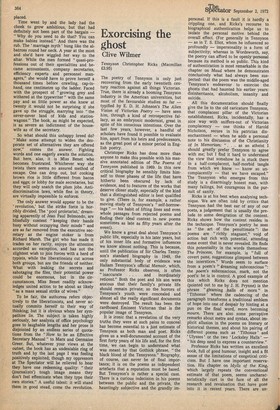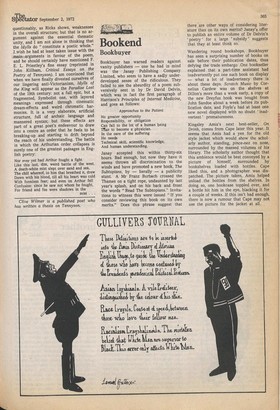Exorcising the ghost
Clive Wilmer
Tennyson Christopher Ricks (Macmillan 0.95) The poetry of Tennyson is only just recovering from the early twentieth century reaction against all things Victorian. True, there is already a booming Tennyson industry in the American universities, but most of the favourable studies so far — typified by E. D. H. Johnson's The Alien Vision of Victorian Poetry — have seen him, through a kind of retrospective fallacy, as an embryonic modernist, great in spite of his conscious intentions. Over the last few years, however, a handful of scholars have found it possible to evaluate him, apart from his heirs and predecessors, as the great poet of a minor period in English poetry.
Christoper Ricks has done more than anyone to make this possible with his massive annotated edition of The Poems of Tennyson published in 1969. In this new critical biography he sensibly limits himself to those phases of the life that have hitherto been obscured by lack of evidence, and to features of the works that deserve closer study, especially of the kind that a distinguished editor is best qualified to give. (There is, for example, a rather moving study of Tennyson's " self-borrowings " — his habit of lifting lines and even whole passages from rejected poems and finding their ideal context in new poems sometimes as late as fifty years after the event).
We know a great deal about Tennyson's public life, especially in his later years, but of his inner life and formative influences we know almost nothing. This is because, until the publication of Sir Charles Tennyson's standard biography in 1949, the only substantial body of evidence was Hallam Tennyson's official Memoir, which, as Professor Ricks observes, is often "inaccurate . . . and inordinately reticent." Both the poet and his son were anxious that their family's private life should remain private; so the horrors of Tennyson's youth were concealed and almost all the really significant documents were destroyed. The result has been the cardboard Eminent Victorian that is the popular image of Tennyson.
It is ironic that a revelation of the very truths they were at such pains to conceal has become essential to a just estimate of Tennyson as both man and poet. Ricks gives us a well-documented account of the first forty years of his life and, for the first time, we can begin to understand what was meant by that Gothick phrase, "the black blood of the Tennysons." Biography, of course, can never be of final importance; it is on the poems as independent artefacts that a reputation must be based. But Tennyson's is rather a special case. There is a curious indecision in his poems between the public and the private, the hauntingly subjective and the grandly im personal. If this is a fault it is hardly a crippling one, and Ricks's recourse to biographical authentication helps us to isolate the personal motive behind the overall effect. (For generally in Tennyson — as in T. S. Eliot, whom he influenced so profoundly — impersonality is a form of subjectivity; whereas in Wordsworth, say, the poetry can afford to be openly personal because its method is so public. This kind of authentication is most remarkable in the chapter on Maud where he demonstrates conclusively what had always been suspected: that the poem was the middle-aged Tennyson's endeavour to exorcise the ghosts that had haunted his earlier years: disinheritance, alcoholism, insanity and suicide.
All this documentation should finally give the lie to the old caricature Tennyson, that complacent pillar of the Victorian establishment. Ricks, incidentally, has a nice way with sniffers-out of Victorian complacency — one thinks of Harold Nicholson, secure in his patrician disenchantment — when he adds a personal note to his discussion of the Christianity Of In Memoriam: " . . as an atheist I should greatly prefer Tennyson to agree with me; but I find it hard to understand the view that somehow he is stuck there in a half-complacent, half-morbid tangle from which we know — know so uncomplacently — that we have escaped." The Tennyson who emerges from this study is a disarmingly honest man, with many failings, but courageous in the pursuit of sanity.
Ricks is at his best when analysing technique. We are often told by critics that Tennyson had the best ear of any of our poets, a judgement that is usually the prelude to some denigration of the content. Ricks shows how the content resides in the technique. Tennyson's poetry he sees as "the art of the penultimate ": the poems are "richly stagnant," void of action but rich with potential, attending some event that is never revealed. He finds this potentiality in the words themselves: The Princess, for example, is "full of covert puns, suggestions glimpsed between the interstices." Words seem to surface from a poem's :" dreaming subconscious ": the poem's subconscious, mark, not the poet's: he is in control. A good example of this which Ricks does not mention (pointed out to me by J. H. Prynne) is the phrase "gleaming halls of morn" in Tithonus ' where the cadencing of the paragraph transforms a traditional emblem of hope into one of despair by hinting at a pun on the final word, morn becoming . mourn. There are also some perceptive remarks about metre and syntax, about implicit allusion in the poems on literary or historical themes, and about his pairing of different poems such as ' Tithonus ' and 'Ulysses' or the two ' Locksley Halls' — "his deep need to express a counterview."
Professor Ricks has written an excellent book, full of good humour, insight and a fit sense of the limitations of exegetical criticism. But I have one important reservation. His chapter on Idylls of the King, which largely repeats the conventional estimate of that poem, seems uncharacteristically curt in the face of all the research and revaluation that have gone into it in recent years. There are un questionably, as Ricks shows, weaknesses in the overall structure; but that is no argument against the essential thematic unity, and I am not alone in thinking that the Idylls do " constitute a poetic whole." I wish he had at least taken issue with the .main, arguments in favour of the poem, and he should certainly have mentioned F. E. L. Priestley's fine essay (reprinted in John Killham, Critical Essays on the Poetry of Tennyson). I am convinced that when we have finally divested ourselves of our lingering anti-Victorianism, Idylls of the King will appear as the Paradise Lost of the 19th century: not a full epic, but a fragmented, Symbolist one, with layered meanings expressed through cinematic dream-effects and weird chromatic harmonies. It is a very elaborate, artificial structure, full of archaic language and mannered syntax; but these effects are part of a great poet's endeavour to draw into a centre an order that he feels to be breaking-up and starting to drift beyond the reach of his understanding. The battle in which the Arthurian order collapses is surely one of the greatest passages in English poetry: Nor ever yet had Arthur fought a fight Like this last, dim, weird battle of the west. A death-white mist slept over sand and sea, The chill whereof, to him that breathed it, drew Down with his blood, till all his heart was cold With formless fear; and even on Arthur fell Confusion: since he saw not whom he fought, For friend and foe were shadows in the
mist . . .
Clive Wilmer is a published poet who has written a thesis on Tennyson.







































 Previous page
Previous page